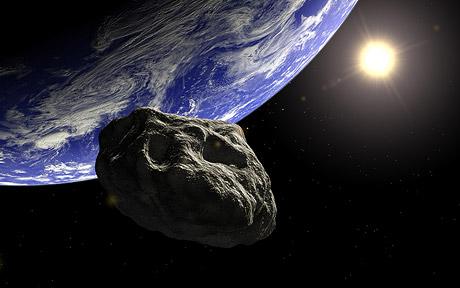西班牙巴利亚多利德大学的科学家日前发表研究报告称,一颗小行星可能会在2182年撞击地球,如果不尽快采取措施改变其运行轨迹的话,它将对地球造成毁灭性的破坏并导致大范围的物种灭绝。巴利亚多利德大学科学家们利用数学模型进行计算后发现,这颗名为1999RQ36的小行星在2200年以前撞击地球的概率为1/1000,而且最可能发生的时间是2182年9月24日。科学家们表示,虽然这一撞击概率看上去很小,但它与小行星阿波菲斯撞击地球的概率相比可大多了。目前,科学家普遍认为阿波菲斯在2036年撞击地球的概率为25万分之一。他们还指出,任何想要迫使该小行星转变运行轨迹以拯救地球的尝试都必须提前至少100年进行,如果到2080年以后才开始采取行动的话,任何努力都将是徒劳。

 |
|
A giant asteroid called 1999 RQ36 may crash into Earth on September 24 2182, scientists believe. |
A giant asteroid called 1999 RQ36 may crash into Earth on September 24 2182, scientists believe.
A team of experts, including some working for NASA, believes the 612-yards-wide object has a one-in-a-thousand chance of an impact 172 years from now.
The odds of a crash are considerably shorter than those given for the asteroid Apophis, which has a 1 in 250,000 chance of striking Earth in 2036.
A report in the solar system journal, Icarus, said the odds of an earlier impact were more remote but increased by 2080 when its orbit will bring it swinging back towards Earth.
Maria Eugenia Sansaturio from the Universidad de Valladolid in Spain, who co-led the research, told Universe Today that knowledge of the risk posed by the asteroid "may help design in advance mechanisms aimed at deviating the asteroid's path."
It was first discovered in 1999 and is more than twice the size of Apophis. If it were to hit it is likely to cause widespread devastation and possible mass extinction.
Sansaturio added: "The consequence … is not just the likelihood of a comparatively large impact, but also that a realistic deflection procedure, or path deviation could only be made before the impact in 2080, and more easily, before 2060.2
Previous asteroid impacts are thought to have created massive craters and tsunamis and have even been blamed for the extinction of the dinosaurs.
相关阅读
(Agencies)

(中国日报网英语点津 Helen 编辑)